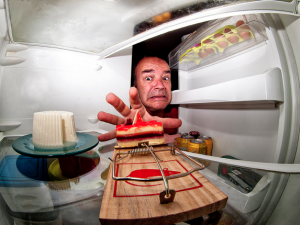Self-control without Willpower: Is It Possible?
By: Grace Lee
Santi Banon, via Flickr
I swear I’ll start my diet tomorrow…
Remember that diet you said you were going to start yesterday? Yet you find yourself scarfing down the donuts your coworker brought to work. Or that promise you made to start saving money? All thoughts went out the window when you saw the sale at the cute boutique around the corner. Sound like a reoccurring problem? You just don’t seem to have enough willpower to say no. However, according to new research, you don’t need willpower to increase self-control.
First, what is the difference between self-control and willpower?
Matthew D. Lieberman, a professor of Psychology, Psychiatry and Biobehavioral Sciences at the University of California, says, “Although willpower and self-control both refer to the same mental process, the nuance implied by each is difference. Willpower is a word for our ability to overcome whatever gets in our way through sheer personal force of mind. Self-control can be read as the ‘the self that is in control’ but it can also be read as ‘that which brings the self under control’ which begs the question ‘for whose sake is the self brought under control?’”
To put into simpler terms, self-control is the ability to discipline one’s mind to think a certain way, and essentially, be the owner of one’s thoughts. Willpower, on the other hand, is to know and be fully aware of one’s desires and impulses and try to force the body to go against them.
But how does this tie into saying no to those morning donuts?
In two recent studies conducted by University of Pennsylvania and Stanford University, researchers sought to increase self-control without increasing willpower.
In study 1, researchers questioned 182 participants with the goal of subtly manipulating the subjects to choose the larger delayed reward rather than the smaller instant reward. The study used monetary sums, and researchers used the explicit-zero method where they worded the question, “Would you prefer $5 today and $0 in a month OR $0 today and $10 in a month?” By wording the question this way rather than “would you prefer $5 today or $10 in a month (called the hidden-zero method)?” Researchers highlight receiving $0 is inevitable, whether in the present or in the future. Thus, the subjects subconsciously reevaluate the rewards.
Through this process, researchers were also able to calculate discount rates, the rate that the value of the rewards decreased by as the delay increased. This helped researchers gain in a monetary sense, when the reward was valued enough to wait and how long of a wait was too long. At the end of the study, changing the way the rewards were presented affected the evaluation of the rewards. Willpower still maintained a large factor, however, the way the rewards were presented played a large role by changing the valuation process and therefore increased self-control.
In study 2, researchers aimed to prove that and willpower were two separate concepts by looking into the participants’ brain activity using functional magnetic resonance imaging (fMRI). The results showed that self-control and willpower are located in different areas of the brain and supported the theory that reframing rewards influenced the valuation process so that participants were more likely to choose the delayed rewards without increasing willpower. Willpower proved to be less needed when the question was framed using the explicit-zero method.
The study concluded that reframing manipulation does not change the amount of willpower the subject had to exert, showing that this is an effective method. For those hoping to gain more self-control, the key is to be fully aware of the short-term and long-term consequences, and therefore, link the future to the present in order to make good choices that would benefit them in the long run. So next time you want that extra donut, think of how it will affect your future: health and appearance-wise. You might think twice after thinking of fitting into that itty-bitty bikini!
Works Cited
Eran Magen, Bokyung Kim, Carol S. Dweck, James J. Gross, and Samuel M. McClure. Behavioral and neural correlates of increased self-control in the absence of increased willpower. PNAS 2014 111: 9786-9791.